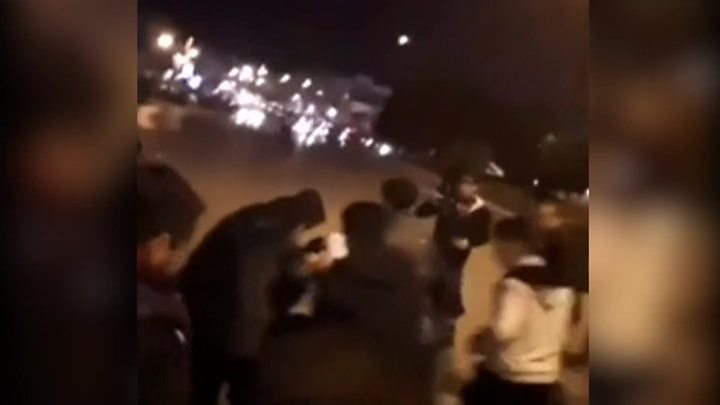Iran protests: 'Iron fist' threatened if unrest continues
Iran's Revolutionary Guards have warned anti-government protesters they will face the nation's "iron fist" if political unrest continues.
Three days of demonstrations over falling living standards have become the biggest show of dissent since huge pro-reform rallies in 2009.
A Revolutionary Guards commander said the protests had degenerated into people chanting political slogans and burning public property.
Two protesters died of gunshot wounds.
The authorities in Dorud in western Iran said security forces did not open fire on demonstrators, and blamed the deaths instead on Sunni Muslim extremists and foreign powers.
Correspondents say the reference to foreign intelligence agencies was intended to mean Saudi Arabia.
Protesters in the cities of Khoramabad, Zanjan and Ahvaz called for the removal or death of Iran's Supreme leader, Ayatollah Ali Khamenei.
Iran's Islamic Revolutionary Guards Corps is a powerful force with ties to the country's supreme leader, and is dedicated to preserving the country's Islamic system.
Brigadier-General Esmail Kowsari told the ISNA news agency: "If people came into the streets over high prices, they should not have chanted those slogans and burned public property and cars."
Iran's interior minister has also warned the public that protesters will be held accountable.
"Those who damage public property, disrupt order and break the law must be responsible for their behaviour and pay the price," Abdolreza Rahmani-Fazli said.
"The spreading of violence, fear and terror will definitely be confronted."
- US warns Iran: The world is watching
- Iranians protest against high prices
- Who are the Basij militia?
Where will the protests lead?
Analysis by Kasra Naji, BBC Persian
There is widespread and seething discontent in Iran where repression is pervasive and economic hardship is getting worse. – one BBC Persian investigation has found that on average Iranians have become 15% poorer in the past 10 years.
Protests have remained confined to relatively small pockets of mostly young male demonstrators who are demanding the overthrow of the clerical regime.
Protests have spread to even small towns throughout the country and have a potential to grow in size.
But there is no obvious leadership. Opposition figures have long been silenced or sent into exile.
Even in exile, there is no one opposition figure that commands a large following. Some protestors have been calling for the return of the monarchy and the former shah's son, Reza Pahlavi, who lives in exile in the United States, has issued a statement supporting the demonstrations. But there are signs that he is as much in the dark about where these protests are going as anyone else.
BBC Persian, which broadcasts on TV, on radio and online from London, is banned in Iran – where staff and their families routinely face harassment and questioning from the authorities.
What has been happening?
Protests began in the north-eastern city of Mashhad on Thursday and spread to other major cities on Friday.
A small demonstration in Tehran grew to several thousand people on Saturday, and students clashed with police. The protests also became violent in several other towns.
Among the recent events across Iran:
- In Abhar, demonstrators set fire to large banners bearing the picture of the supreme leader
- In Arak, protesters reportedly set fire to the local headquarters of the pro-government Basij militia
- In Mashhad, protesters burned police motorcycles in a confrontation caught on video
- The CEO of popular mobile messaging app Telegram said an Iranian account had been suspended for calling for attacks on police
- There are numerous reports of people losing internet access on their mobile phones
- Street protests have been reported in a number of other towns and cities, including Kermanshah, Shahrekord, Bandar Abbas, Izeh, Zanjan, Karaj, Tonekabon and Khorramabad
There is also anger at Iran's interventions abroad. In Mashhad, some chanted "not Gaza, not Lebanon, my life for Iran", a reference to what protesters say is the administration's focus on foreign rather than domestic issues.
- Iran 'building permanent military base' in Syria
- Yemen crisis: Who is fighting whom?
- Why Saudi Arabia and Iran are bitter rivals
Iran is a key provider of military support to the government of Bashar al-Assad in Syria. It is also accused of providing arms to Houthi rebels fighting a Saudi-led coalition in Yemen, which it denies, and is an ally of Lebanon's powerful Shia movement Hezbollah.
What has been the response, at home and abroad?
The Iranian authorities are blaming anti-revolutionaries and agents of foreign powers for the outbreak.
Also on Saturday, thousands of pro-government demonstrators turned out for pre-arranged rallies to mark the eighth anniversary of the suppression of the 2009 street protests.
The US has led international support for the protesters.
President Donald Trump tweeted: "Oppressive regimes cannot endure forever, and the day will come when the Iranian people will face a choice. The world is watching!"
Iran's foreign ministry called earlier comments from Mr Trump and other US officials "opportunistic and deceitful".
Who are the Revolutionary Guards?
Iran's Islamic Revolution Guards Corps (IRGC) was set up shortly after the 1979 Iranian revolution to defend the country's Islamic system.
It has since become a major force in the political, economic and military life of the country, with its own ground forces, navy and air force. It controls a volunteer militia of tens of thousands of people – the Basij Resistance Force.
The IRGC sometimes works alongside police, and it was announced in December that it would do this again.
Its stature says it will co-operate with law enforcement forces "when necessary" but there has been some controversy over its scope when dealing with civilians.

